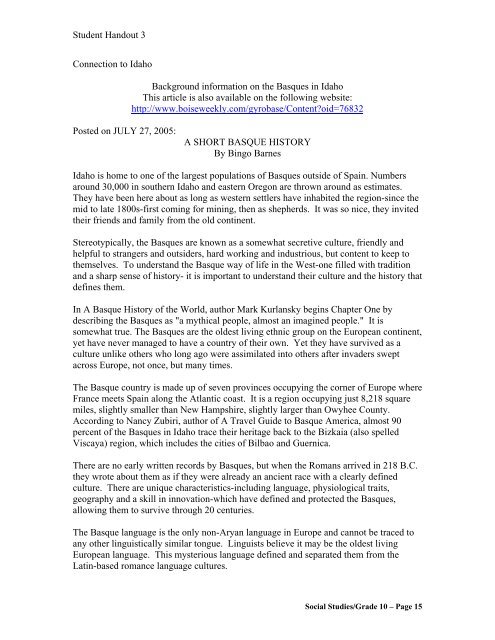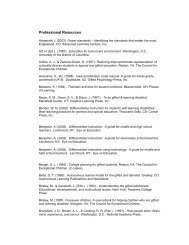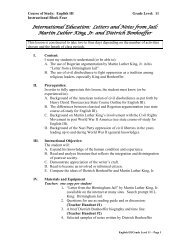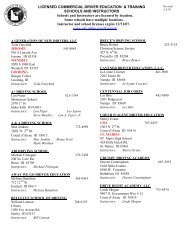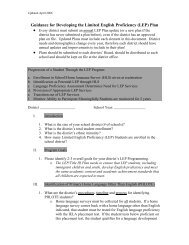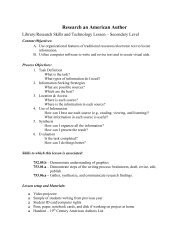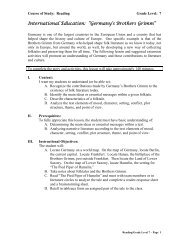US History I - Grade level 10 - Basque Country - Idaho State ...
US History I - Grade level 10 - Basque Country - Idaho State ...
US History I - Grade level 10 - Basque Country - Idaho State ...
You also want an ePaper? Increase the reach of your titles
YUMPU automatically turns print PDFs into web optimized ePapers that Google loves.
Student Handout 3<br />
Connection to <strong>Idaho</strong><br />
Background information on the <strong>Basque</strong>s in <strong>Idaho</strong><br />
This article is also available on the following website:<br />
http://www.boiseweekly.com/gyrobase/Content?oid=76832<br />
Posted on JULY 27, 2005:<br />
A SHORT BASQUE HISTORY<br />
By Bingo Barnes<br />
<strong>Idaho</strong> is home to one of the largest populations of <strong>Basque</strong>s outside of Spain. Numbers<br />
around 30,000 in southern <strong>Idaho</strong> and eastern Oregon are thrown around as estimates.<br />
They have been here about as long as western settlers have inhabited the region-since the<br />
mid to late 1800s-first coming for mining, then as shepherds. It was so nice, they invited<br />
their friends and family from the old continent.<br />
Stereotypically, the <strong>Basque</strong>s are known as a somewhat secretive culture, friendly and<br />
helpful to strangers and outsiders, hard working and industrious, but content to keep to<br />
themselves. To understand the <strong>Basque</strong> way of life in the West-one filled with tradition<br />
and a sharp sense of history- it is important to understand their culture and the history that<br />
defines them.<br />
In A <strong>Basque</strong> <strong>History</strong> of the World, author Mark Kurlansky begins Chapter One by<br />
describing the <strong>Basque</strong>s as "a mythical people, almost an imagined people." It is<br />
somewhat true. The <strong>Basque</strong>s are the oldest living ethnic group on the European continent,<br />
yet have never managed to have a country of their own. Yet they have survived as a<br />
culture unlike others who long ago were assimilated into others after invaders swept<br />
across Europe, not once, but many times.<br />
The <strong>Basque</strong> country is made up of seven provinces occupying the corner of Europe where<br />
France meets Spain along the Atlantic coast. It is a region occupying just 8,218 square<br />
miles, slightly smaller than New Hampshire, slightly larger than Owyhee County.<br />
According to Nancy Zubiri, author of A Travel Guide to <strong>Basque</strong> America, almost 90<br />
percent of the <strong>Basque</strong>s in <strong>Idaho</strong> trace their heritage back to the Bizkaia (also spelled<br />
Viscaya) region, which includes the cities of Bilbao and Guernica.<br />
There are no early written records by <strong>Basque</strong>s, but when the Romans arrived in 218 B.C.<br />
they wrote about them as if they were already an ancient race with a clearly defined<br />
culture. There are unique characteristics-including language, physiological traits,<br />
geography and a skill in innovation-which have defined and protected the <strong>Basque</strong>s,<br />
allowing them to survive through 20 centuries.<br />
The <strong>Basque</strong> language is the only non-Aryan language in Europe and cannot be traced to<br />
any other linguistically similar tongue. Linguists believe it may be the oldest living<br />
European language. This mysterious language defined and separated them from the<br />
Latin-based romance language cultures.<br />
Social Studies/<strong>Grade</strong> <strong>10</strong> – Page 15


